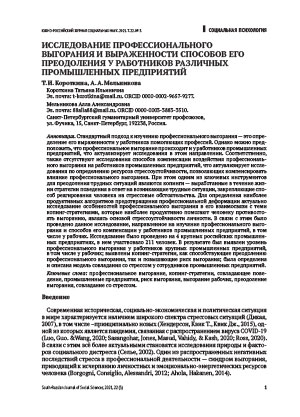Abstract
The standard approach to the study of professional burnout is to define its manifestations in helping professions. Nevertheless, it can be assumed that industrial workers also suffer from it, which opens new ways in studying professional burnout and makes this study topical and timely. It must be mentioned that ways of compensating the impact of industrial burnout on workers have not been described either. It means that the study involving research into stress tolerance resources to compensate for occupational burnout are also topical and timely. One of the key tools for overcoming difficult situations is coping; these are life-long strategies for responding to difficult situations that reinforce the way a person responds to stressful situations. Naturally, to find the most productive algorithms for preventing professional deformation, it might be necessary to study the characteristics of occupational burnout in its interconnection with those coping strategies that help withstand it since they are the basis of personality stress tolerance. Thereby, the given research aimed at studying professional burnout and ways of its compensation among industrial employees, including workers. The study was carried out at 4 large Russian industrial enterprises, with 211 participants. As a result, the level of professional burnout among employees, including workers, at large industrial enterprises was identified; coping strategies have been identified, both to overcome professional burnout and to increase the risk of burnout; and a stress management model for industrial workers was identified and described.
Keywords
References
Влах, Н.И. (2015). Модель психологической помощи представителям «помогающих» профессий при эмоциональном выгорании. Вестник южно-уральского государственного университета. Серия: Психология, 4, 24–30.
Водопьянова, Н.Е. (2016). Когнитивные копинг-стратегии, противодействующие профессональному выгоранию. В Психология стресса и совладающего поведения: ресурсы, здоровье, развитие (с. 135–137). Кострома: издательство КГУ.
Водопьянова, Н.Е., Ковальчук, Н.С. (2008). Исследование профессиональных деформаций представителей профессий, относящихся к типу «человек — человек». СПб.: СПБГУ.
Волкова, Н.В. (2004). Coping strategies как условие формирования идентичности. Мир психологии, 2(38), 119–124.
Дикая, Л.Г. (2007). Актуальные проблемы и перспективы исследований в психологии труда в условиях глобализации. Психологический журнал, 28(3), 29–44.
Короткина, Т.И., Мельникова, А.А. (2019). Профессиональное выгорание и психологические способы совладания с ним у работников разных уровней крупных промышленных предприятий. В Субъект труда и организационная среда: проблемы взаимодействия в условиях глобализации. Коллект. монография. А.Л. Журавлев, Т.А. Жалагина, Е.А. Журавлева и др. (с. 188–200). Тверь: Тверской государственный университет.
Крюкова, Т.Л., Куфтяк, Е.В. (2007). Опросник способов совладания (адаптация методики WCQ). Журнал практического психолога, 3, 93–112.
Муфтахова, Ф.С. (2009). Изучение проблемы синдрома эмоционального выгорания и поведение преодоления в стрессовых ситуациях. Вестник башкирского университета, 1, 290–293.
Набиуллина, Р.Р., Тухтарова, И.В. (2003).Механизмы психологической защиты и совладания со стрессом. Казань: Казанская государственная медицинская академия.
Руденко, Ф.Г. (2012). Исследование психологических аспектов межличностных отношений и конфликтов на предприятиях производственного комплекса. Историческая и социально-образовательная мысль, 6(16), 191–194.
Селье, Г. (2002). Стресс без дистресса. Рига: Внеда.
Совмиз, З.Р. (2016). Личностные регуляторы преодоления стресса субъектами групповой деятельности. Южно-Российский журнал социальных наук, 4, 138–152.
Фетискин, Н.П. (2015). Психология воспитания стрессосовладающего поведения. М.: Форум, НИЦ ИНФРА-М.
Хендерсон, Д.Ф., Квик, Т.Л., Квик, Дж. К. (2015). Век стресса: теории стресса и «превентивное управление стрессом» в глобальном контексте. Организационная психология, 5(3), 10–25.
Шленков, А.В., Кошкаров, В.С. (2014). Функциональная модель развития устойчивости к эмоциональному выгоранию сотрудников пожарных частей. Научно-аналитический журнал вестник санкт-петербургского университета государственной противопожарной службы МЧС России, 3, 115–119.
Ялтонский, В.М., Сирота, Н.А. (2008). Психология совпадающего поведения: развитие, достижения, проблемы, перспективы. В А.Л. Журавлевой, Т.Л. Крюковой, Е.А. Сергиенко (ред.) Совпадающее поведение: Современное состояние и перспективы (с. 21–56). Москва: Институт психологии РАН.
Ahola, K., Hakanen, J. (2014). Burnout and Health. In Leiter M.P., Bakker A.B., Maslach C. (Eds). Burnout at Work: A Psychological Perspective. London: Psychology Press.
Biggs, A., Brough, P., & Drummond, S. (2017). Lazarus and Folkman’s Psychological Stress and Coping Theory. In C.L. Cooper & J.C. Quick (Eds.) The Handbook of Stress and Health (pp. 349–364). John Wiley & Sons, Ltd.
Borgogni, L., Consiglio, C., Alessandri, G. et al. (2012). “Don’t Throw the Baby out with the Bathwater!” Interpersonal Strain at Work and Burnout. European Journal of Work and Organizational Psychology, 21(6), 1–24.
Dal Pai, D., Lautert, L., Souza SBC et al. Violence, Burnout And Minor Psychiatric Disorders in Hospital Work. Revista da Escola de Enfermagem da USP, 49(3), 457–464.
Demerouti, E., Bakker, A., Nachreiner, F., & Schaufeli, W. (2001). The Job Demands-Resources Model of Burnout. Journal of Applied Psychology, 86(3), 499–512.
Demerouti, E., Mostert, K., & Bakker, A.B. (2010). Burnout and Work Engagement: A Thorough Investigation of the Independency of both Constructs. Journal of Occupational Health Psychology, 15(3), 209–222.
González-Morales, M, Peiró, J., Rodríguez, I. et al. (2012). Perceived Collective Burnout: A Multilevel Explanation of Burnout. Anxiety Stress Coping, 25, 43–61.
Lazarus, R.S., Folkman, S. (1992). The Concept of Coping. In A. Monat, S. Richard S. Lazarus. Stress and Coping (pp. 189–206). N.-Y: Columbia University Press.
Lazarus, R. (2002). Psychological Stress and Coping Process. New York: Frydenberg.
Leon, M., Halbesleben, J., Paustian-Underdahl, S. (2015). A Dialectical Perspective on Burnout and Engagement. Burnout Research, 2, 87–96.
Luo, M, Guo, L, Yu, M. & Wang, H. (2020). The Psychological and Mental Impact of Coronavirus Disease 2019 (COVID‑19) on Medical Staff and General Public — A Systematic Review and Meta-Analysis. Psychiatry Research, 291, DOI: 10.1016/j.psychres.2020.113190
Maslach, C, Leiter, M.P., Schaufeli, W.B. (2009). Measuring Burnout. In C.L. Cooper, S. Cartwright (Eds) The Oxford Handbook of Organizational Well-being (pp. 86–108). Oxford: Oxford University Press.
Matheny, K.B., Curlette, W.L., Aysan, F., Herrington, A. (2002). Coleman A.G., Thompson D., Hamarat E. Coping resources, perceived stress, and life satisfaction. International Journal of Stress Management, 9, 81–97.
Perrez, M. (2001). Coping Assessment. The International Encyclopedia of the Social and Behavioral Sciences, 4. Retrieved from https://www.researchgate.net/publication/2523063_International_Encyclopedia_of_the_Social_and_Behavioral_Sciences
Sasangohar, F, Jones, S.L., Masud, F.N. et al. (2020). Provider Burnout and Fatigue During the COVID‑19 Pandemic: Lessons Learned from a High-Volume Intensive Care Unit. Anesthesia and Analgesia, 131(1), 106–111.
Shiron, A, Melamed, S. (2006) A Comparison of the Construct Validity of Two Burnout Measures in Two Groups of Professionals. Stress Manage, 13, 176–200.
Ross, J. (2020). The Exacerbation of Burnout During COVID‑19: A Major Concern for Nurse Safety. Perianesth Nurs, 35(4), 439–440.


